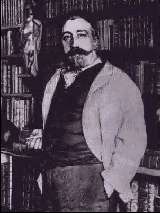
Born: April 16, 1844, in Paris, France
Died: October 13, 1924, near Tours, France
Anatole France, a pseudonym of Jacques Anatole Francois Thibault, was the son of Francois-Noël Thibault, a Parisian book seller and Antoinette Galas. As a child, France was an avid reader and spent many hours in his father's shop reading the books that were available for sale. He had little formal education but he learned quickly with the book shop as a resource. By the age of eight, he was able to translate passages from Virgil for his mother.
When he was eleven, France was enrolled at the Stanislas College in Paris where he studied the classics for seven years. During his time at school he began to question his Roman Catholic upbringing and finally completely abandoned religion. He was uncomfortable at the college and completed his studies independently but earned his bachelor's degree by the age of twenty.
After graduation, France began working and writing but neither activity generated a substantial income. He was often forced to rely on his parents for food and lodging. Eventually, he gained a position as librarian of the senate which afforded him a degree of independence from his family.
He was married to Valérie Guérin de Sauville who was a little more than half his age. Together they had a single daughter, Suzanne, in 1881.
France's first novel, The Crime of Sylvestre Bonnard was published in 1881. The cutting irony, warmth and compassion that would come to mark France's work, were clearly evident in this first novel. The book was well received and won a prize from the Académie Français.
The year 1883 was a pivotal point in France's career. It was at this time that he developed a relationship with Madame Armand de Caillavet. She provided the inspiration and motivation for many of his works and through her strong social position was able to promote his work as well. She turned his writing toward social causes such as worker's rights and civil liberties. Their friendship eventually escalated into an affair that lasted twenty-five years. Throughout the relationship, de Caillavet remained married even though France had a room in her house.
France's reputation as a writer was soon firmly established and he was able to commit all his energies to writing. He divorced his wife in 1892 and established his permanent residence with de Caillavet until her death in 1910. Throughout this time, France turned his writing against many of the established institutions including the church, the army and the government. His support for left- leaning organizations grew but he was eventually disillusioned with their causes and saw in them the same faults he had seen in many other institutions.
In 1908, he published the novel Penguin Island which, through the allegorical travels of a monk, satirized nationalism and Christianity.
Sometime after the death of de Caillavet, France began an affair with Emma Laprévotte and the eventually married in 1920. A year later, France was awarded the Nobel Prize for Literature. When he died in 1924, he was given a national funeral.